Employee recruitment has undergone a massive shift in trends and processes due to AI in recruitment. What once was just about posting a job advertisement and then filtering candidates based on fit has now become a gamut of various activities. The impact of AI on recruitment is changing the paradigm. From identifying top talent worldwide and looking into the employees’ mentality to creating new workflows — recruitment is not the same as it was a year ago. And while emerging technologies are making processes easier, various factors — the increase in remote and hybrid work culture, evolving business operations, and evolving talent behavior — are making hiring a tough nut to crack.
To tackle the challenges, organizations are adopting AI for recruiting to make the whole recruitment process standardized and seamless. As a result, companies are adopting artificial intelligence on a larger scale. At the moment, only 10% of companies use AI today, but predictions show that 36% of the organizations expect an increase in usage in the next two years.
So, what does AI recruiting translate to? AI recruiting means incorporating HR software that can execute repetitive and technical tasks usually carried out by humans, such as decision making, translation, voice recognition, etc. It is a crucial element of the HR technology ecosystem as it saves time and energy in finding the right fit for your company.
In this blog post, we’ll discuss:
- How is artificial intelligence changing the recruitment process
- Ways AI recruitment tools are helping recruiters make smart and data-driven decisions
- The challenges of adopting AI, and
The future of AI recruiting in the coming years.
How to Use AI in Recruitment to Empower HRs in Talent Acquisition?
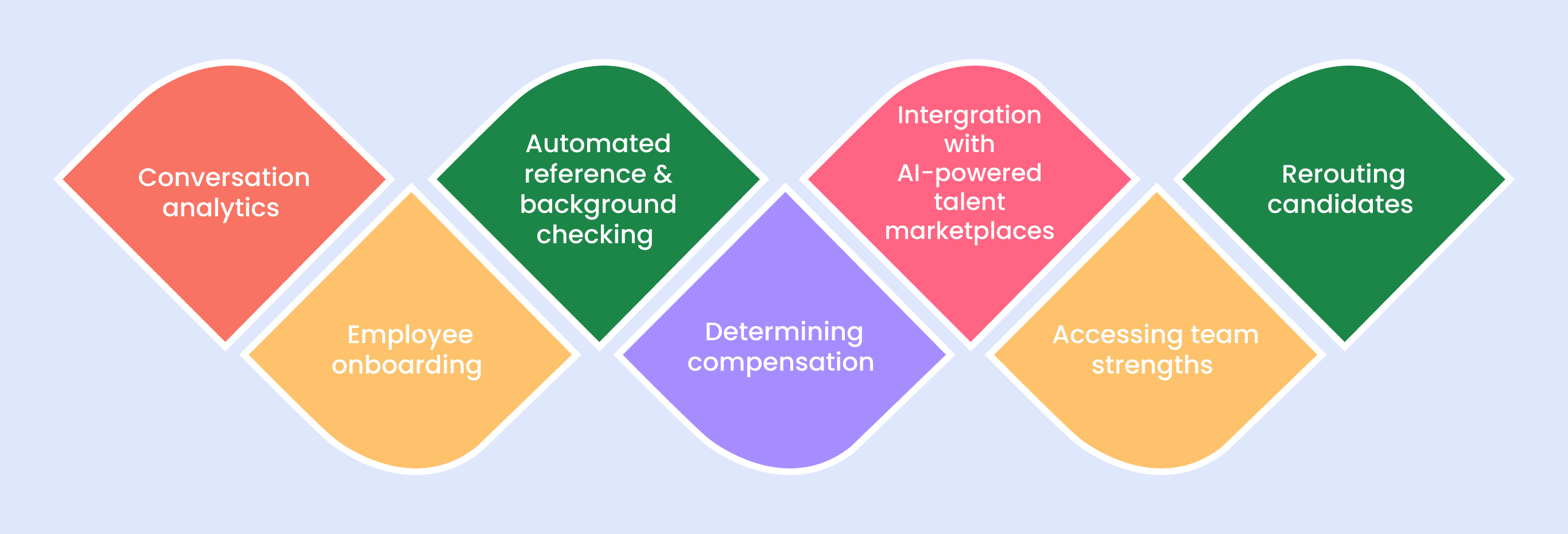
AI recruitment tools are gradually finding their way into different aspects of the recruitment process, such as sourcing through pre-selection, candidate interviewing, reference and background checks, determining employee compensation, and more.
Below are eight uses of AI in the recruitment process.
Conversation analytics
When scaling your teams, it’s challenging to keep the interviews consistent and high-quality. Technologies exist that enable the interviewers to improve their experience by providing them with actionable insights into each interview. The goal here is to allow companies to interview their candidates more effectively and make better hiring decisions.
Such AI in recruitment software automatically records and transcribes the interviews you conduct — both via video call or in-person. The insights you get from these transcribed notes can help you know the effectiveness of your interviewers, frequently asked questions by candidates, and where to make improvements.
Employee onboarding
Onboarding is an essential process for welcoming new hires to your organization. Done right, it can create a good impression among them about your company and boost the productivity of the HR department. It is crucial for nourishing and retaining the best talent.
The onboarding process starts the minute the candidate accepts your job offer and continues until they start working for your company. From collecting and sending documents and providing training to assigning an onboarding buddy — there’s a lot to be done by HR for a positive employee experience. This is where AI for hiring can help to smoothen the process.
AI recruitment tools can automate repetitive administrative tasks. Further, AI virtual assistants can answer basic employee questions about different onboarding aspects and ensure 24/7 onboarding. The integrated employee training and learning tools can also create and recommend personalized courses to new hires based on their skills and experience.
Physical interview robots
Imagine a recruiter that treats every candidate the same, asks the same questions, and doesn’t discriminate against an employee based on color, gender, or race. Sounds unbelievable? Well, not anymore because now you can use physical recruitment robots to conduct one round of a job interview.
These bots combine natural language processing (NLP) and interview analytics to determine an employee’s soft skills and personality traits. They ensure consistency and provide the same interview experience to each candidate. However, not everyone will like to get interviewed by a machine. So, it’s crucial to ensure that your candidates understand why your company uses physical bots instead of humans for one round.
Automated reference and background checking
Even though background checking is a time-consuming and tedious task, it’s an essential step since it reduces the risk for companies. Hence, it makes sense to use AI in recruitment for processes involving background checks.
Not only does the AI-powered background checking technology reduce bias, but it also protects the privacy of the candidates by checking on the relevant information — making the whole process easier, quicker, and more efficient.
Reference checking is another time-consuming task that happens at the end of the recruitment process. Manually checking the reference can pose reliability issues for both the referee and the review itself. Further, there can be various practical challenges, such as people may not be available to communicate when you call them, referees don’t get automated reminders, and more.
This is where an AI-infused reference checking tool can solve these problems. It helps collect the necessary information on a single platform, send questionnaires to referees, and remind them about it to avoid long waiting times.
Determining compensation
Determining the fair compensation for the new employee can be pretty complicated as there are various elements HRs have to consider, such as salary, bonuses and commissions, overtime pay, retirement, vacation, healthcare benefits, etc.
There’s no fixed compensation package for every employee — it depends on your industry, employee role, and local laws. Since these factors keep changing with time, it can be challenging to keep track of this data.
Enter: AI-based compensation software.
The tool allows HRs to decide compensation for each employee by taking specific skills and geographic data into account.
Integration with AI-powered talent marketplaces
The gig economy and remote work culture have led to the rise of freelance marketplaces such as Fiverr, Upwork, PeoplePerHour, etc. Having easy to navigate integrations with this platform is a good way to get the best talent from their large database.
These aren’t just platforms where freelancers and employers meet. These AI recruitment tools talent marketplaces analyze the skills and experience of the workers and match them with the requirements of organizations — saving time and increasing efficiency on both sides.
Assessing team strengths
Earlier, organizations used to consider whether the individual is the right fit for the company culture. But now, the focus has shifted from individuals to teams. Hiring a candidate who isn’t a good fit for the team can be risky for the company. It can reduce the overall productivity of other team members and bring their performance down. This is one of the biggest advantages of using AI in recruitment.
AI-powered pre-employment assessment tools help companies hire candidates who match the team’s skills and culture. These tools use machine learning and data analytics to understand the individual’s characteristics and how these influence their collaboration and performance while working in a team.
Rerouting candidates
In today’s competitive job market, it’s crucial for HRs to build and maintain a pool of candidates interested in working in your company. You often come across individuals who aren’t the right fit for the job right now, but they can be suitable in the future — for another role or location. Instead of losing them to competitors, you can build a relationship with them and keep them interested in your organization.
Research shows that only 7% of companies currently use AI to reroute people to suitable roles or locations, but this is expected to increase over the next two years. Therefore, it is important to start engagement with the potential hires early to grab their attention and keep them in the funnel with tools that use AI in recruitment.
How Can HRs Benefit from AI in Recruitment?
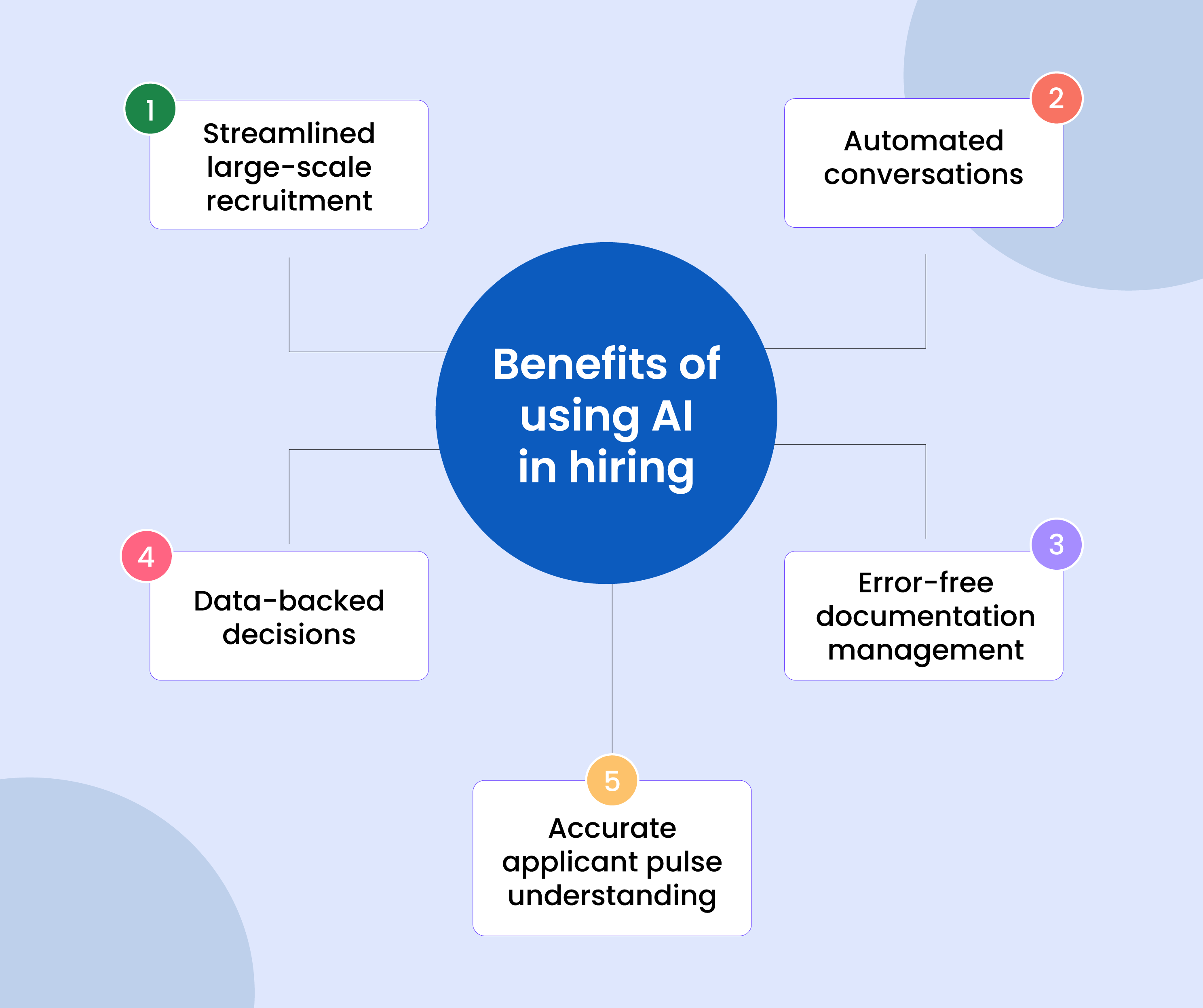
By the use of artificial intelligence in the hiring process, HRs can streamline various aspects of the hiring process as well as hit multiple goals at the same time. Below are some of the benefits that AI in recruitment can bring for HRs:
Recruiting at scale
AI recruitment tools are helping growing companies find, hire, and manage the best talent. These platforms are making the whole recruitment process faster and smarter, allowing the small companies to compete with the larger ones in ways they never imagined.
For example, research shows that up to 40% time of recruiters is spent on entering data into an ATS or sifting through tons of resumes to find the right candidate. However, you can quickly filter out the unsuitable candidates with advanced algorithms and artificial intelligence. AI makes it easy to gather important information about candidates and helps recruiters make quick but better decisions.
Automated conversations
AI for recruiting allows companies to automate conversations between the recruiters and the candidates. It can handle day-to-day communicative tasks, such as arranging interviews, sending a questionnaire to candidates to get answers on previous experience, sending notifications to recruiters when receiving a resume, providing feedback, or reminding candidates to submit their documents. AI-based tools can even personalize these messages based on the candidate’s information.
Better documentation
During the onboarding process, HR sends a welcome message to the new hires and some essential documents like an offer letter, policy documents, and links to fill out digital forms. This amount of paperwork can become overwhelming for the candidates to manage alongside other formalities. Even for HR, it can be challenging to keep track of onboarding documents manually — especially when the company is recruiting at scale.AI recruitment tools can help automate entire documentation process and reduce human errors in logging data of new hires.
Understanding people’s sentiments
AI in recruitment has the potential to process large volumes of data effectively and come up with insights that can help HRs understand the applicant’s emotions and sentiments during the recruitment process.
It uses biometrics, facial recognition, and computational linguistics to judge the candidates’ sentiments without any scope for error and gauge their interest in the role. It not only helps recruiters make better hiring decisions but also enhances the candidate’s experience during the recruiting process.
Data-backed decisions
HRs usually make assumptions about the candidate’s fitment for the job role based on their skills, potential, and past experiences. But with machine learning recruitment and AI-backed data, organizations can evaluate everything an applicant brings to the table through a larger database of information. This includes qualitative data like how well the candidate fits into a given role and how long they are likely to stay with the company.
Further, data allow HRs to efficiently sift through applications and interview only the best candidates for the role. In a nutshell, data and AI help recruiters hire someone who will excel in the role and contribute to the organization’s long-term growth.
Challenges of Adopting AI in the Recruitment Process
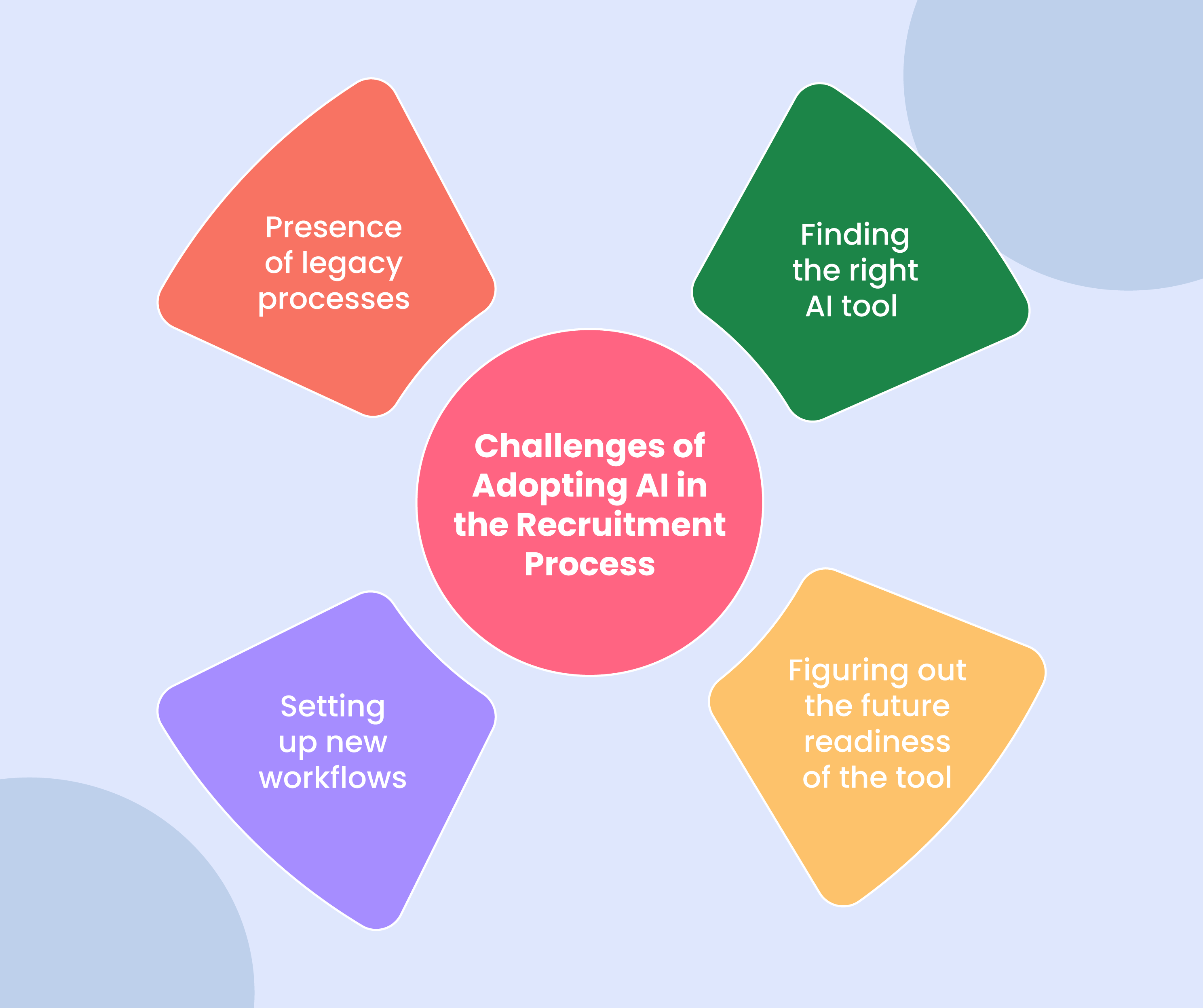
The role of AI in recruitment process has multiple benefits. However, if the adoption of AI-powered tools is not done properly, multiple issues can arise. Let’s look at some challenges of using artificial intelligence to find the best people for your organization.
Presence of legacy processes
HR managers and leaders are often used to existing processes and they don’t want to get out of their comfort zone.
Maybe they dread that the implementation of AI-powered software or AI in talent acquisition can destroy their current recruiting process. Or perhaps, they are unsure that any technology that promises to automate their tasks will be able to perform as good of a job as they can. Hence, it can be tough to convince all the stakeholders to adopt AI in the recruitment process.
Finding the right AI tool
When you’re adopting AI for hiring, you want to make sure that it’s scalable and can be integrated with your existing applicant tracking system (ATS) and other HR tools. For example, it should also come in handy for employee onboarding, conducting employee engagement surveys, measuring employee performance, and so on — along with employee recruitment. However, not all platforms come with this feature, which can make the task of finding the right tool pretty difficult and time-consuming. It is important to find a tool that is already integrated with popular enterprise software and collaboration tools.
Figuring out the future readiness of the tool
Recruitment processes are continually evolving — owing to changing work cultures and advanced technologies. Therefore, the recruitment tool that you choose should be able to scale with your business and be ready for future advancements.
Not only does this prevent you from changing the AI recruitment tool repeatedly, but this also saves you a lot of time and money on finding and leveraging the right software for your company. However, figuring out whether the tool is scalable is not simple and can take a lot of time and consideration from the recruiters.
Setting up workflows
AI in recruitment or even HR, in general, can open a lot of doors and provide tons of opportunities, which can be pretty overwhelming for an organization. So, another big challenge is to find an AI-powered tool that can make setting up different HR workflows straightforward.
If you’re looking for such a tool, Leena AI can help automate different recruitment workflows, such as employee screening, conducting interviews, employee onboarding, and so on. In short, it aims to help companies streamline all their HR workflows.
Setting up workflows
AI in recruitment or even HR, in general, can open a lot of doors and provide tons of opportunities, which can be pretty overwhelming for an organization. So, another big challenge is to find an AI-powered tool that can make setting up different HR workflows straightforward.
If you’re looking for such a tool, Leena AI can help automate different recruitment workflows, such as employee screening, conducting interviews, employee onboarding, and so on. In short, it aims to help companies streamline all their HR workflows.
Employee Recruitment of the Future

AI in talent acquisition is changing the HR industry, making AI-powered HR solutions the future of employee recruitment. There is already some tremendous recruitment software out there, and their number is likely to increase in the future.
However, since the recruitment process can change owing to the changing work environment and constant technological innovations, it’s highly critical for these AI-driven tools to learn and evolve with time. They can make your hiring process more effective and you wouldn’t have to worry about adapting your HR tools to the changes in the coming period. Plus, you will get tons of free time to focus on more crucial matters, such as listening to candidates and building robust relationships with them.
Wrapping Up
Although AI in talent acquisition and machine learning recruitment is pretty new in the hiring equation, it is a vital step toward making the tasks more effective and efficient by using a data-driven approach. It has occupied a stable and influential position in the recruiting process for many companies. So, if you’re still not looking into the possibilities of AI for your organization, NOW is the time to do so.



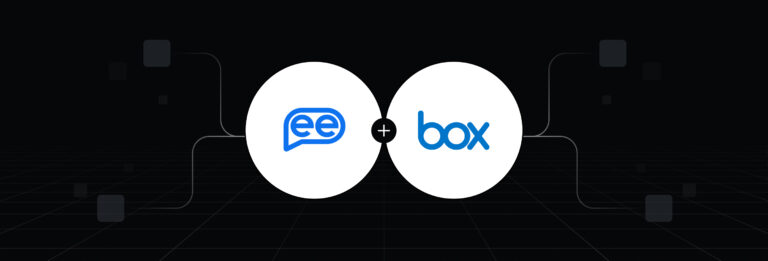
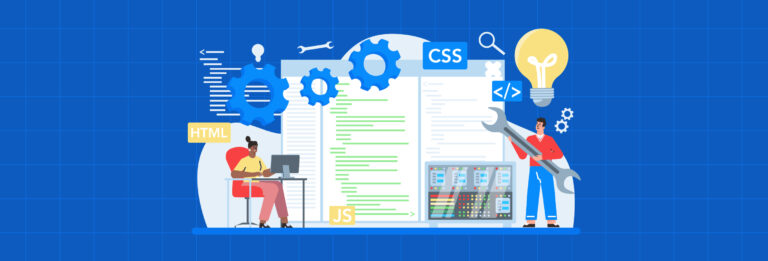

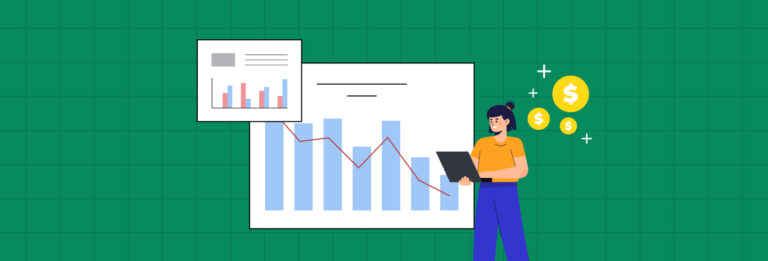
2 Comments